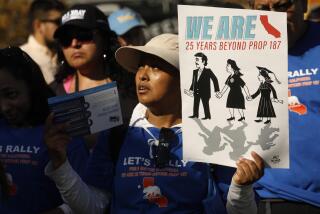Houston Thinks Globally in OK of Preferences
- Share via
HOUSTON — In the largest city of the South, where free-market capitalism is a holy commandment, affirmative action would seem like sacrilege. Houston is a businessman’s town--no zoning, no income tax, no tolerance for government meddling.
But on Wednesday, a day after voters here had decisively upheld the city’s affirmative action policy, Houston’s political and business leaders insisted that there is nothing contradictory about promoting both the liberal ideals of inclusion and the conservative ideals of commerce. In today’s global marketplace, they said, affirmative action makes good economic sense.
“This is about capitalizing on our diversity,” said Mayor Bob Lanier, 72, a wealthy white developer who put his own prestige on the line by leading the charge on behalf of racial and gender preferences. “It’s about decency, but it’s also about business. It’s to our economic advantage to be an open and inviting society.”
Modeled after Proposition 209, which was approved by California voters last November, Houston’s Proposition A was only the second ballot measure in the country to challenge the precepts of affirmative action--and, as such, it was considered a major test of efforts to roll back those programs nationwide. If approved, it would have abolished the city’s goal of awarding 20% of its more than $1 billion in municipal contracts to female- and minority-owned firms.
Critics of that arrangement collected 20,000 signatures to place the matter before voters, only to see the measure defeated Tuesday by a 55%-to-45% margin. They argued that their loss had nothing to do with feel-good economics and everything to do with semantics--especially the disputed wording of Proposition A as it ultimately appeared on the Houston ballot.
Borrowing from the backers of California’s Proposition 209, who contributed about $20,000 to the effort here, the organizers of Proposition A called their anti-affirmative action measure the “Houston civil rights initiative.” In its original form, the proposition asked voters to decide whether the city should “discriminate against” anyone on the basis of “race, sex, color, ethnicity or national origin.”
Under pressure from Lanier, the City Council last month voted to change that language, which the mayor described as misleading and a contributing factor to the passage of the California measure. Instead, Houston voters were asked to decide the fate of “affirmative action for women and minorities . . . including ending the current program and any similar programs in the future.”
Lanier said this would guarantee a “straight up-and-down vote,” eliminating any confusion over whether affirmative action is perceived as a cause of discrimination or a remedy to it. But Edward Blum, an investment broker who led the initiative drive, blasted Lanier’s revisions as subjective and cynical. He has filed a lawsuit, asking a judge to restore the original wording and set a new election.
“It doesn’t matter if 20,000 Houstonians decide they want to compel city employees to wear funny orange caps on Fridays--they should have the right to consider the language that will be implemented as the law,” Blum said. “The language that they voted on did not fulfill the intent and meaning of what we were trying to accomplish.”
Polls before the election suggested that the wording was no small factor. As many as 70% of voters said they would support Proposition A when phrased as an anti-discrimination measure; that number dropped to about 47.5% when it was phrased as an anti-affirmative action measure.
“When they saw the polling data,” Blum contended, “they changed the language.”
As much as that wording may have swayed voters, several other factors played into Proposition A’s failure.
Unlike California, which remains a predominantly Anglo state, Houston is a primarily non-Anglo city--about 33% Latino, 26% African American and 6% Asian. Just as voters in ethnically diverse Los Angeles overwhelmingly cast ballots against Proposition 209, Houston’s many minority voters--and even a large number of low-income whites--were deeply opposed to Proposition A.
In addition, their turnout was boosted by a wide-open mayoral race, headed by Lee Brown--the city’s former police chief and ex-White House drug czar--who is seeking to become Houston’s first black mayor. Brown, who opposed Proposition A, led the field with 41% of the vote and is set for a December runoff with Rob Mosbacher, a white oilman who supported the initiative.
Lanier, after three terms, was barred by the City Charter from seeking reelection. But it was his leadership against Proposition A that was most cited Wednesday as the impetus for its defeat. Homespun yet infallibly shrewd, Lanier often spoke poignantly of his childhood in segregated Houston, a time of “brutal repression,” he recalled. He filmed a TV spot that ran frequently in the campaign’s final weeks, warning that “a group from California” wants to turn back the clock to a time when “guys who look like me” got all the city’s business.
And he convinced many of Houston’s boosters and business elite, including the Greater Houston Partnership and the Houston Chronicle, that affirmative action creates a positive climate for the city’s increasingly worldwide commercial trade.
“I think this shows that Houston has transcended its redneck Southern past and is recognizing its destiny as a multiethnic, international city in a global economy,” said Stephen Klineberg, a Rice University sociologist. “General harmony is good for business.”
Times researcher Lianne Hart contributed to this story.
More to Read
Get the L.A. Times Politics newsletter
Deeply reported insights into legislation, politics and policy from Sacramento, Washington and beyond. In your inbox twice per week.
You may occasionally receive promotional content from the Los Angeles Times.










